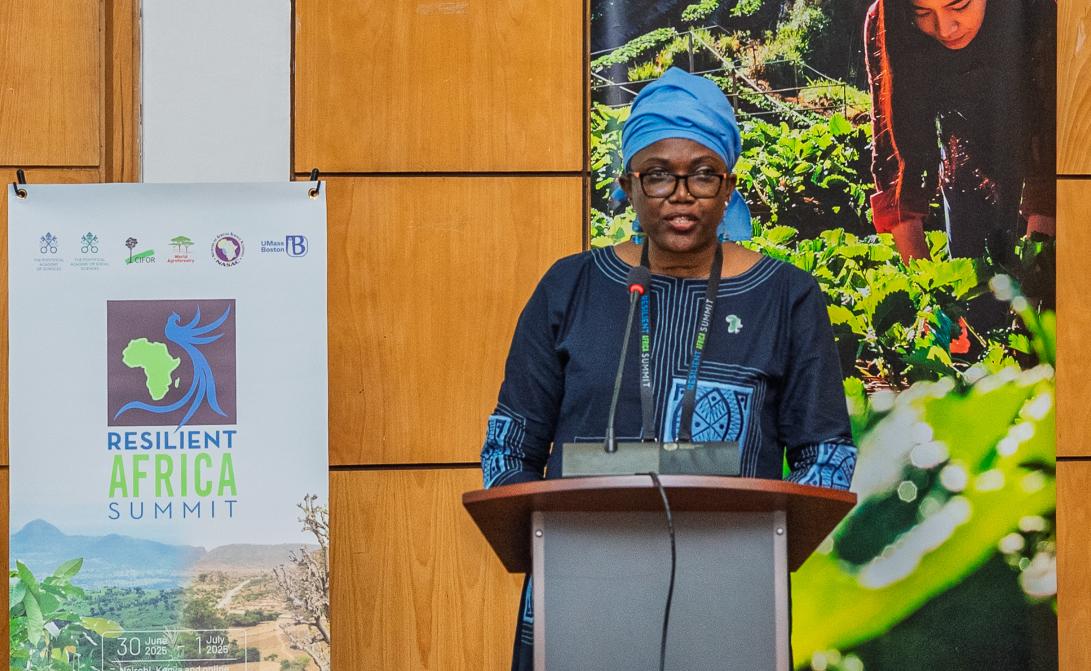 Dr Jacqueline Kado, Executive Director of the Network of African Science Academies (NASAC) makes her address at the Vatican African Conference on Climate Resilience held in Nairobi/HANDOUT
Dr Jacqueline Kado, Executive Director of the Network of African Science Academies (NASAC) makes her address at the Vatican African Conference on Climate Resilience held in Nairobi/HANDOUTA powerful coalition of African leaders, scientists, youth activists, and faith-based organisations has issued an urgent appeal for a major scale-up in climate finance to support locally led adaptation efforts across the continent.
The call to action was made during the Vatican African Conference on Climate Resilience, a landmark gathering in Nairobi that brought together key stakeholders under the auspices of the Pontifical Academy of Sciences (PAS), the Pontifical Academy of Social Sciences (PASS), and in partnership with CIFOR-ICRAF, the Network of African Science Academies (NASAC), and a broad network of African institutions.
Building on momentum from the 2023 African Climate Summit and the Africa Youth Climate Assembly Declaration, the conference spotlighted Africa’s growing climate vulnerability and the urgent need for resources to match its ambitious resilience strategies.
“We have all witnessed the devastating effects of climate change — from prolonged droughts to catastrophic floods that are disrupting livelihoods and ecosystems in Africa,” said Dr Éliane Ubalijoro, CEO of CIFOR-ICRAF.
“The time to act is now. But without adequate and timely resources reaching communities on the frontlines, even the most ambitious strategies will remain words on paper.”
Participants emphasised that global climate finance systems must evolve to ensure direct, equitable access to funds for cities, local governments, and community organisations.
They urged the creation of innovative financing instruments tailored specifically to African contexts.
Dr Wilber Ottichilo, Governor of Vihiga County and Chair of the Council of Governors’ Environment Committee, warned that weak institutional coordination, funding gaps, and limited technical capacity are obstructing Africa’s climate resilience journey.
“These challenges highlight the need for increased support, funding, and capacity building to help Africa adapt to climate change and build resilience,” Dr Ottichilo said.
The conference underscored the importance of science-based, inclusive, and community-driven solutions, noting the vital roles played by Africa’s academies of science, indigenous knowledge holders, and faith-based and civil society organisations.
“Africa can achieve climate resilience when action-oriented alliances of local governments, civil society, science, farming communities and business are formed, and supported by increased volume and quality of adaptation finance,” said Dr Joachim von Braun, President of the Pontifical Academy of Sciences.
“Africa’s resilience journey must be science-informed, locally led, justice-grounded, youth-driven and community-rooted,” added Dr Jacqueline Kado, Executive Director of NASAC.
A key outcome of the conference was the recognition that building resilience in food, land, and water systems is essential to safeguarding African livelihoods.
Speakers highlighted the potential of integrated land use planning, climate-smart agriculture, and water harvesting—especially when informed by local innovation and African research.
















